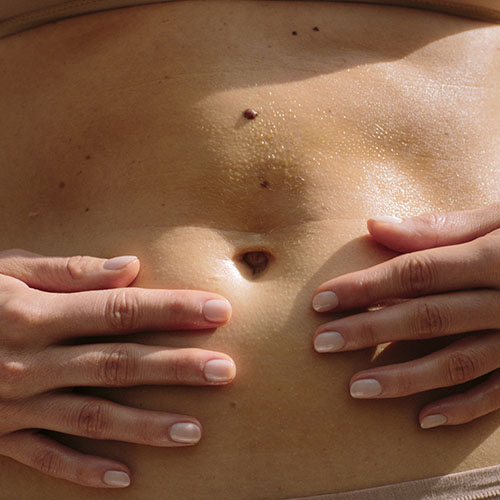
Unveiling “The Golden Effect” – Harnessing Saffron for Menstrual Health
Saffron, famously dubbed as “red gold,” stands as one of the most coveted spices globally, owing to its exquisite nature

Experiencing sensations of fullness, abdominal pressure, bloating, and discomfort are all characteristics of an unpleasant bloated stomach, often accompanied by a range of symptoms. Swift and effective treatment hinges on pinpointing the underlying cause, yet this task is not always straightforward due to the multitude of factors contributing to stomach discomfort. We delve into the common triggers of these symptoms, shedding light on what often leads to this discomfort and offering insights into addressing the diverse causes and symptoms associated with bloating.
If you find yourself grappling with stomach pain, bloating, and an overall sense of discomfort, the quest to unearth the underlying causes swiftly begins… Was it something you ate the day before? Could it be a bout of gastrointestinal distress? Perhaps the discomfort is linked to the menstrual cycle? Given the myriad factors at play, identifying the exact source of these unpleasant symptoms is often a complex task. Regardless of whether it stems from dietary choices, hormonal fluctuations, a potential pathogen, or an entirely different catalyst, seeking professional advice through a doctor’s visit is always recommended.
Nevertheless, gaining awareness of the potential triggers for a bloated stomach allows for better prevention and a quicker alleviation of symptoms. With this in mind, we delve into the precise causes of abdominal bloating and offer insights into proactive measures to prevent and alleviate the accompanying irksome symptoms.
The diet
A primary contributor to bloating often lies in dietary choices, and it’s important to note that this doesn’t necessarily imply an unhealthy diet. Frequently, the culprit is specific foods that may not align well with our individual tolerances. This can swiftly result in an accumulation of gas in the digestive tract, culminating in the discomfort of a bloated stomach.
Equally significant is the manner in which we consume our meals. Individuals who habitually eat too quickly often find themselves grappling with bloating and other digestive issues. If you find yourself frequently contending with bloating, it might be beneficial to check not only the contents of your diet but also the pace at which you consume your meals. Adjusting both aspects could prove instrumental in mitigating the occurrence of bloating and associated digestive problems.
Constipation
Another factor intricately tied to diet that can lead to bloating is constipation. When digestion slows down, gasses tend to accumulate, giving rise to unpleasant or even painful symptoms. This typically manifests as an added sense of pressure, fullness, and, in certain instances, an overall feeling of discomfort. To promptly and effectively alleviate constipation, you have a few options including, suitable medications or turning to natural remedies. Consuming a glass of warm water with a pinch of salt on an empty stomach, incorporating prune juice into your routine, or embracing a diet rich in high-fiber foods can naturally alleviate discomfort.
Bacterial or viral diseases
A bloated stomach may indicate an underlying illness triggered by bacteria or viruses. Gastroenteritis, for instance, often presents with air in the stomach as a typical symptom. However, when this is the root cause of bloating, it is typically accompanied by additional gastrointestinal symptoms that are either absent or infrequent in other causes of bloating. These symptoms encompass nausea, vomiting, diarrhea, fever, and a general sense of malaise. If you find yourself experiencing these symptoms, there is a likelihood of having the flu or a similar illness. In such cases, seeking medical attention is advisableto thoroughly examine and address the symptoms.
Chronic diseases
Persistent bloating could be indicative of an underlying chronic illness disrupting the balance of intestinal flora. One common culprit is irritable bowel syndrome (IBS), known to trigger constipation, bloating, a distended stomach, as well as diarrhea and abdominal pain. Additionally, chronic inflammatory bowel diseases, like Crohn’s disease, can contribute to a bloated stomach. However, in the case of Crohn’s disease, symptoms typically manifest episodically, facilitating easy recognition of the clinical picture. If you suspect the presence of such a chronic illness, it is imperative to consult with your doctor. Through comprehensive examinations, including procedures like gastroscopy or
colonoscopy, healthcare professionals can swiftly determine whether further tests or medication are necessary. Early intervention and accurate diagnosis play a pivotal role in managing and addressing potential chronic gastrointestinal issues.
Cycle-related problems
The menstrual cycle, marked by its distinct phases, introduces significant changes, particularly in hormonal balance. Any disruption in this balance can give rise to various complaints, including the discomfort of a bloated stomach. This is often attributed to the cycle hormone progesterone, prominently released in the second half of the cycle. Progesterone’s influence leads to a less active gastrointestinal tract, potentially resulting in issues such as constipation, abdominal cramps, or bloating. Notably, this hormonal action is why a bloated belly typically becomes noticeable just before or during the menstrual period, a characteristic symptom of PMS.
Treatment primarily targets alleviating complaints like abdominal pain, digestive problems, and a bloated stomach. The Noon, with its warming and relaxing properties, can offer relief in managing these symptoms effectively.
While a bloated stomach can stem from various causes, persistent discomfort, pain, or additional symptoms warrant a visit to a healthcare professional. Consulting a doctor can reliably discern whether the symptoms are temporary or indicative of underlying issues such as chronic gastrointestinal illnesses, viral or bacterial infections, cycle-related concerns, or other factors. Once the precise cause of stomach discomfort is identified, interventions can be implemented swiftly and effectively, enabling you to fully enjoy life once again.
Sources:
Apotheken Umschau (2021): Flatulence: Causes and help against air in the stomach
Yvonne Küster (2021): Flatulence
Healthy and vital (2021): The 5 most common causes of bloating
Reizdarm.net (2019): Bloated belly (meteorism)
Intimgesundheit.info (2022): Bloating during your period

Saffron, famously dubbed as “red gold,” stands as one of the most coveted spices globally, owing to its exquisite nature

Our body, mood, and overall well-being are greatly influenced by hormones. We become acutely aware of this influence during puberty,

Today, let’s embark on a journey through the intricate workings of our bodies and the profound influence of cycle hormones.

Experiencing sensations of fullness, abdominal pressure, bloating, and discomfort are all characteristics of an unpleasant bloated stomach, often accompanied by

While it is true that men can also suffer from cystitis, the urethra is much shorter in women than in

Migraines are a common and very unpleasant headache disorder. In Germany, around 14.8% of women and 6% of men are
![]()
123 Main Street
City Name, Region
Postal Code, Country
Designed & Developed by e-outbox.